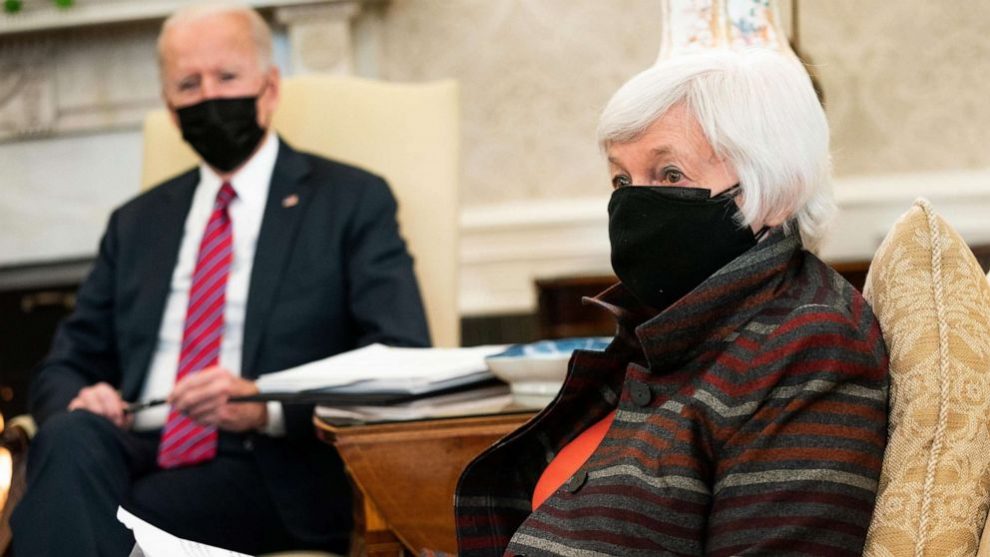Every once in a while, Sen. Joe Manchin, a Democrat from bright red West Virginia surprises his Republican colleagues by taking their side. For instance, in October 2018, he voted for the confirmation of then-Judge Brett Kavanaugh to the Supreme Court.
On Friday, Manchin led a group of seven Democrats and one independent to vote against raising the minimum wage to $15 — and it took a personal phone call from President Joe Biden to keep Manchin in the fold.
As if $1.9 trillion was not already an astonishing ask from American taxpayers, House Speaker Nancy Pelosi decided to sneak a $15 minimum wage increase into the bill. A hike in the minimum wage has long been on the Democrats’ wish list. If it were included in this reconciliation bill, it would only require a simple majority (51 votes) to pass in the Senate. Due to the legislative filibuster, as a stand-alone bill, 60 votes would be needed for its passage.
According to the Congressional Budget Office, such a move would cost Americans approximately 1.4 million jobs. In 2020, the U.S. lost nearly 10 million jobs because of the coronavirus pandemic, according to a CNBC report.
Some small businesses that have so far weathered the COVID-induced lockdowns would immediately be forced to close their doors.
But there was another equally valid reason to remove the minimum wage hike from the bill.
In addition to its effect on the economy, Senate parliamentarian Elizabeth MacDonough ruled that the minimum wage hike’s inclusion in the COVID relief bill violated Senate rules, according to CNBC.
Immediately, some Democrats wanted McDonogough fired, as The Washington Post reported.
In a post on his website, George Washington University law professor Jonathan Turley described how bad the situation had become:
In using reconciliation, Turley wrote, “Democrats triggered the ‘Byrd rule’ – which limits the type of provisions in the reconciliation process to taxing and spending. The purpose is to limit an add-on through reconciliation to measures designed to have a direct impact on the federal budget—barring the use of reconciliation to introduce ‘extraneous’ measures. Otherwise, reconciliations could circumvent the normal legislative process and the filibuster option for the minority. The rule allows a senator to object when a reconciliation bill is brought to the floor through a Point of Order on the bill. After the Byrd Rule is raised, the Senate Parliamentarian informs the Presiding Officer on how to rule and the Presiding office conveys that to the Senate. Senators can then vote to overrule the Presiding Officer but the process protects the minority and the parliamentarian by requiring that a vote to overrule secure a three-fifths majority.
“The Parliamentarian’s role is key to a system of orderly legislative process. To simply disregard such rules (and fire those who seek to maintain them) is yet another example of the rage that has replaced reason in our current politics. Byrd was famous for putting the interests of the Senate and the Constitution before his own party. This effort shows [how] increasingly rare such institutional defenders have become in this age of rage.”
On Friday, according to The Daily Caller, the seven Senate Democrats who joined 50 Republicans to remove the minimum wage hike from the COVID relief bill were Manchin, Tom Carper and Chris Coons of Delaware, Maggie Hassan and Jeanne Shaheen of New Hampshire, Kyrsten Sinema of Arizona and Jon Tester of Montana.
Sen. Angus King of Maine, an independent, also voted against the increase.
Echoing then-Sen. John McCain’s famous “thumbs down” on a vote to overturn Obamacare in 2017, Sinema made the gesture to signal her vote, USA Today reported.
Now that Democrats hold such a slim majority in the Senate, Manchin’s vote matters more than ever. After he led the charge on taking the minimum wage hike out of the bill, Democratic leaders perhaps took his objections to other features of the bill a bit more seriously.
The Democratic leader in the White House was one of those forced to take notice.
Politico reported Friday that Manchin delayed passage of the massive $1.9 trillion COVID-19 relief bill for 10 hours last week before a phone call from Biden, as well as a meeting with Senate Majority Leader Chuck Schumer and several concessions on unemployment benefits persuaded him to side with Democrats.
The Senate eventually passed the bill on Saturday by a vote of 50-49, with no Republicans in favor. Alaska Republican Dan Sullivan was not present after going to Alaska for his father-in-law’s funeral, according to The Hill. That made it unnecessary for Vice President Kamala Harris to case a tie-breaking vote.
Given that so little of this bill will actually help those affected by COVID, we kind of wish Manchin had used his vote to derail this wasteful expenditure altogether. It would have been especially nice if Manchin had addressed some of the more egregious parts of the bill, such as the $350 billion in what Republicans are calling “blue-state bailouts.” These are the payments to states such as New York, Illinois, and California whose fiscal mismanagement has left them deeply in debt.
In remarks to their colleagues ahead of the vote, Senate Minority leader Mitch McConnell said, “The Senate has never spent $2 trillion in a more haphazard way. … Their [Democrats’] top priority wasn’t pandemic relief. It was their Washington wish list.”
President Biden’s $1.9 trillion Covid-19 relief bill, the American Rescue Plan Act, passed the Senate 50-49 on Saturday.
Chuck Schumer and Mitch McConnell addressed the Senate before the vote https://t.co/7ur9ZJAPuQ pic.twitter.com/zqHhX3OSAK
— Bloomberg Quicktake (@Quicktake) March 6, 2021
Ultimately, Manchin’s hesitance cut “several weeks of unemployment benefits off of Sen. Tom Carper’s (D-DE) compromise amendment from earlier in the day and added a $150,000 cap to the proposal’s tax deduction for up to $10,200 in unemployment benefits,” according to Politico.
Instead of unemployment benefits continuing until Sept. 30, they “will expire on Labor Day in the middle of a scheduled recess,” Politico reported.
Politico wrote that Manchin had “hinted” in a Tuesday interview that he might try to make changes in the bill. He said he expected the economy to improve by June or July as more and more Americans get vaccinated. And he questioned the logic in “paying people more than $1,000 extra a month to stay home.”
Manchin told Politico: “We want people to get back to work. We’re gonna have a hard time getting people ready to go back in to keep the economy going. It’d be awful for the doors to open up and there’s no one working. … That’s the problem.”
This surprised his Democratic colleagues, Politico reported, who thought they had already reached a compromise with Manchin. They had agreed to lower the weekly benefit to $300, to making those payments nontaxable, and to allowing them to run through September.
In the meantime, according to Politico, Manchin had told Ohio Sen. Rob Portman, a Republican, that he would support his amendment to the bill, which would end unemployment benefits in July.
When Portman’s amendment came up for a vote on Friday, Manchin voted yes. However, Politico noted, Manchin “also supported the Democratic alternative he pushed to change, effectively overwriting his vote with the GOP.”
Wisconsin Sen. Tammy Baldwin, a Democrat, told Politico that Democrats were “worried about getting to final passage ‘without doing major injury to the bill.’”
Politico wrote that “Manchin’s dramatic play on Friday perplexed even his West Virginia counterpart, Republican Sen. Shelley Moore Capito.” Capito noted that the West Virginia governor “had been pushing Congress to go bigger, not smaller.”
“I have no idea what he’s doing, to be quite frank,” Capito told Politico. “Maybe you can tell me.”
One thing he’s not doing it is making it easy for Biden to push his agenda.
Story cited here.
























